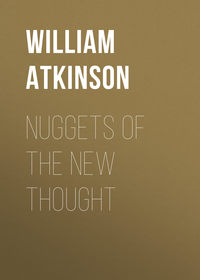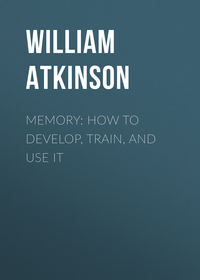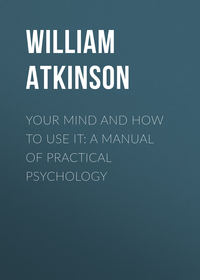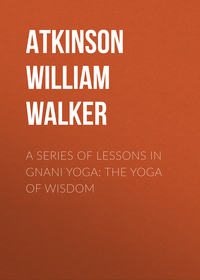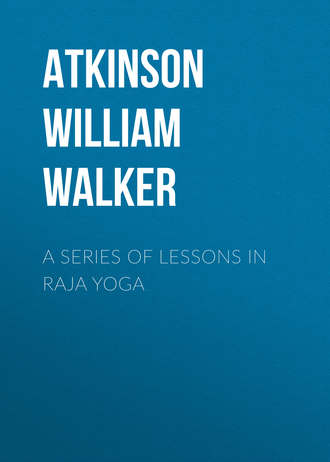 полная версия
полная версияA Series of Lessons in Raja Yoga
And yet you will say that it seems hard to think that the same thing can be Right in one person and Wrong in another. This seems like a hard saying and a dangerous doctrine, but it is the Truth. And man instinctively recognizes it. He does not expect the same sense of moral responsibility in a young child, or in a savage, that he does in a mature, developed, civilized man. He may restrain the child and the savage, for self-protection and the welfare of all, but he realizes the distinction, or at least should do so. And not only is this true, but as man advances in the scale he casts off many ideas of "Wrong" that he once held, having outgrown the old ideas and having grown into new conceptions. And the tendency is always upward and onward. The tendency is constantly from Force and Restraint toward Love and Freedom. The ideal condition would be one in which there were no laws and no necessity for them—a condition in which men had ceased to do wrong because they had outgrown the desire rather than from fear or restraint or force. And while this condition as yet seems afar off, there is constantly going on an unfoldment of higher planes and faculties of the mind, which when once fully manifest in the race will work a complete revolution in ethics and laws and government—and for the better, of course. In the meantime Mankind moves along, doing the best it can, making a steady though slow progress.
There is another plane of the mind which is often called the "Instinct," but which is but a part of the plane of the Intellect, although its operations are largely below the field of consciousness. We allude to what may be called the "Habit Mind," in order to distinguish it from the Instinctive Plane. The difference is this: The Instinctive plane of mind is made up of the ordinary operations of the mind below the plane of the Intellect, and yet above the plane of the Vegetative mind—and also of the acquired experiences of the race, which have been transmitted by heredity, etc. But the "Habit Mind" contains only that which has been placed there by the person himself and which he has acquired by experience, habit, and observation, repeated so often until the mind knows it so well that it is carried below the field of consciousness and becomes "second nature," and akin to Instinct.
The text books upon psychology are filled with illustrations and examples of the habit phase or plane of the mental operations, and we do not think it necessary to repeat instances of the same kind here. Everyone is familiar with the fact that tasks which at first are learned only by considerable work and time soon become fixed in some part of the mind until their repetition calls for little or no exercise of conscious mental operation. In fact, some writers have claimed that no one really "learns" how to perform a task until he can perform it almost automatically. The pupil who in the early stages of piano playing finds it most difficult to control and manage his fingers, after a time is able to forget all about his fingering and devote his entire attention to the pages of his music, and after this he is able to apparently let his fingers play the entire piece of music by themselves without a thought on his part. The best performers have told us that in the moments of their highest efforts they are aware that the out-of-conscious portion of their mind is doing the work for them, and they are practically standing aside and witnessing the work being done. So true is this that in some cases it is related that if the performer's conscious mind attempts to take up the work the quality is impaired and the musician and the audience notice the difference.
The same thing is true in the case of the woman learning to operate the sewing machine. It is quite difficult at first, but gradually it grows to "run itself." Those who have mastered the typewriter have had the same experience. At first each letter had to be picked out with care and effort. After a gradual improvement the operator is enabled to devote her entire attention to the "copy" and let the fingers pick out the keys for themselves. Many operators learn rapid typewriting by so training the habit mind that it picks out the letter-keys by reason of their position, the letters being covered over in order to force the mind to adapt itself to the new requirements. A similar state of affairs exists wherever men or women have to use tools of any kind. The tool soon is recognized by the mind and used as if it were a part of the body, and no more conscious thought is devoted to the manipulation than we devote to the operation of walking, which, by the way, is learned by the child only by the expenditure of time and labor. It is astonishing how many things we do "automatically" in this way. Writers have called our attention to the fact that the average man cannot consciously inform you how he puts on his coat in the morning—which arm goes in first, how the coat is held, etc. But the habit mind knows—knows very well. Let the student stand up and put on his coat in the regular way, following the leadings of the habit mind. Then, after removing it, let him attempt to put it on by inserting the other arm first, for instance. He will be surprised to find out how awkward it will be for him, and how completely he has been depending upon the habit mind. And tomorrow morning let him find out which shoe the habit mind has been putting on him first and then try to reverse the order and notice how flurried and disturbed the habit mind will become, and how frantically it will signal to the conscious mind: "Something wrong up there!" Or try to button on your collar, reversing the order in which the tabs are placed over the button—right before left, or left before right, as the case may be, and notice the involuntary protest. Or, try to reverse the customary habit in walking and attempt to swing your right arm with the movement of your right leg, and so on, and you will find it will require the exercise of great will power. Or, try to "change hands" and use your knife and fork. But we must stop giving examples and illustrations. Their number is countless.
Not only does the habit mind attend to physical actions, etc., but it also takes a hand in our mental operations. We soon acquire the habit of ceasing to consciously consider certain things, and the habit mind takes the matter for granted, and thereafter we will think automatically on those particular questions, unless we are shaken out of the habit by a rude jolt from the mind of someone else, or from the presentation of some conflicting idea occasioned by our own experience or reasoning processes. And the habit mind hates to be disturbed and compelled to revise its ideas. It fights against it, and rebels, and the result is that many of us are slaves to old outgrown ideas that we realize are false and untrue, but which we find that we "cannot exactly get rid of." In our future lessons we will give methods to get rid of these old outgrown ideas.
There are other planes of mind which have to do with the phenomena known as "psychic," by which is meant the phases of psychic phenomena known as clairvoyance, psychometry, telepathy, etc., but we shall not consider them in this lesson, for they belong to another part of the general subject. We have spoken of them in a general way in our "Fourteen Lessons in Yogi Philosophy, etc."
And now we come to the plane of mind known to us as Intellect or the Reasoning Faculties. Webster defines the word Intellect as follows: The part or faculty of the human soul by which it knows, as distinguished from the power to feel and to will; the thinking faculty; the understanding. The same authority defines the word Reason as follows: "The faculty or capacity of the human mind by which it is distinguished from the intelligence of the inferior animals." We shall not attempt to go into a consideration of the conscious Intellect, for to do so we would be compelled to take up the space of the remaining lessons of the course, and besides, the student may find extended information on this subject in any of the text books on psychology. Instead we will consider other faculties and planes of mind which the said text books pass by rapidly, or perhaps deny. And one of these planes is that of Unconscious Reasoning, or Intellect. To many this term will seem paradoxical, but students of the unconscious will understand just what is meant.
Reasoning is not necessarily conscious in its operations, in fact, a greater part of the reasoning processes are performed below or above the conscious field. In our last lesson we have given a number of examples proving this fact, but a few more remarks may not be out of place, nor without interest to the student.
In our last lesson you will see many instances stated in which the sub-conscious field of the Intellect worked out problems, and then after a time handed to the conscious reason the solution of the matter. This has occurred to many of us, if not indeed to all of us. Who has not endeavored to solve a problem or question of some sort and after "giving it up" has had it suddenly answered and flashed into consciousness when least expected. The experience is common to the race. While the majority of us have noticed these things, we have regarded them as exceptional and out of the general rule. Not so, however, with students of the mental planes. The latter have recognized these planes of reason, and have availed themselves of their knowledge by setting these unconscious faculties to work for them. In our next lesson we will give directions to our students regarding this accomplishment, which may prove of the greatest importance to those who will take the trouble to practice the directions given. It is a plan that is known to the majority of men who have "done things" in the world, the majority of them, however, having discovered the plan for themselves as the result of a need or demand upon the inner powers of mind.
The plane of mind immediately above that of Intellect is that known as Intuition. Intuition is defined by Webster as follows: "Direct apprehension or cognition; immediate knowledge, as in perception or consciousness, involving no reasoning process; quick or ready insight or apprehension." It is difficult to explain just what is meant by Intuition, except to those who have experienced it—and these people do not need the explanation. Intuition is just as real a mental faculty as is Intellect—or, to be more exact, is just as much a collection of mental faculties. Intuition is above the field of consciousness, and its messages are passed downward, though its processes are hidden. The race is gradually unfolding into the plane of Intuition, and the race will some day pass into full consciousness on that plane. In the meantime it gets but flashes and glimpses from the hidden region. Many of the best things we have come from that region. Art, music, the love of the beautiful and good poetry, the higher form of love, spiritual insight to a certain degree, intuitive perception of truth, etc., etc., come from this region. These things are not reasoned out by the intellect, but seem to spring full born from some unknown region of the mind.
In this wonderful region dwells Genius. Many, if not all of the great writers, poets, musicians, artists and other examples of genius have felt that their power came to them from some higher source. Many have thought that it emanated from some being kindly to them, who would inspire them with power and wisdom. Some transcendent power seemed to have been called into operation, and the worker would feel that his product or creation was not his handiwork, but that of some outside intelligence. The Greeks recognized this something in man, and called it man's "Daemon." Plutarch in his discourse on the daemon that guided Socrates speaks of the vision of Timarchus, who, in the case of Trophonius, saw spirits which were partly attached to human bodies, and partly over and above them, shining luminously over their heads. He was informed by the oracle that the part of the spirit which was immersed in the body was called the "soul," but that the outer and unimmersed portion was called the "daemon." The oracle also informed him that every man had his daemon, whom he is bound to obey; those who implicitly follow that guidance are the prophetic souls, the favorites of the gods. Goethe also spoke of the daemon as a power higher than the will, and which inspired certain natures with miraculous energy.
We may smile at these conceptions, but they are really very close to the truth. The higher regions of the mind, while belonging to the individual, and a part of himself, are so far above his ordinary consciousness that to all intents and purposes messages from them are as orders from another and higher soul. But still the voice is that of the "I," speaking through its sheaths as best it is able.
This power belongs to every one of us, although it manifests only in the degree that we are able to respond to it. It grows by faith and confidence, and closes itself up, and withdraws into its recesses when we doubt it and would question its veracity and reality. What we call "originality" comes from this region. The Intuitive faculties pass on to the conscious mind some perception of truth higher than the Intellect has been able to work out for itself, and lo! it is called the work of genius.
The advanced occultist knows that in the higher regions of the mind are locked up intuitive perceptions of all truth, and that he who can gain access to these regions will know everything intuitively, and as a matter of clear sight, without reasoning or explanation. The race has not as yet reached the heights of Intuition—it is just beginning to climb the foothills. But it is moving in the right direction. It will be well for us if we will open ourselves to the higher inner guidance, and be willing to be "led by the Spirit." This is a far different thing from being led by outside intelligence, which may, or may not, be qualified to lead. But the Spirit within each of us has our interests at heart and is desirous of our best good, and is not only ready but willing to take us by the hand and lead us on. The Higher Self is doing the best it can for our development and welfare, but is hampered by the confining sheaths. And alas, many of us glory in these sheaths and consider them the highest part of ourselves. Do not be afraid to let the light of the Spirit pierce through these confining sheaths and dissolve them. The Intuition, however, is not the Spirit, but is one of its channels of communication to us. There are other and still higher planes of mind, but the Intuition is the one next in the line of unfoldment, and we should open ourselves to its influence and welcome its unfoldment.
Above the plane of Intuition is that of the Cosmic Knowing, upon which we will find the consciousness of the Oneness of All. We have spoken of this plane in our lesson on the Unfoldment of Consciousness. When one is able to "conscious" on this plane—this exalted plane of mind—he is able to see fully, plainly and completely that there is One Great Life underlying all the countless forms and shapes of manifestation. He is able to see that separateness is only "the working fiction of the Universe." He is able to see that each Ego is but a Centre of Consciousness in the great Ocean of Life—all in pursuance of the Divine Plan, and that he is moving forward toward higher and higher planes of manifestation, power and individuality, in order to take a greater and grander part in the Universal work and plans.
The Cosmic Knowing in its fulness has come to but few of the race, but many have had glimpses, more or less clear, of its transcendent wonder, and others are on the borderland of this plane. The race is unfolding gradually, slowly but surely, and those who have had this wonderful experience are preparing others for a like experience. The seed is being sown, and the harvest will come later. This and other phases of the higher forms of consciousness are before the race. The individuals who read this lesson are perhaps nearer to it than they think; their interest in the lessons is an indication of that hunger of the soul which is a prophecy of the satisfaction of the cry for spiritual bread. The Law of Life heeds these cries for aid and nourishment and responds accordingly, but along the lines of the highest wisdom and according to the real requirements of the individual.
Let us close this lesson with a quotation from "Light on the Path," which bears directly upon the concluding thought. Read it carefully and let it sink down deep into your inner consciousness, and you will feel the thrill of joy that comes to him who is nearing the goal.
"Look for the flower to bloom in the silence that follows the storm; not till then.
"It shall grow, it will shoot up, it will make branches and leaves, and form buds while the storm lasts. But not until the entire personality of the man is dissolved and melted—not until it is held by the divine fragment which has created it, as a mere subject for grave experiment and experience—not until the whole nature has yielded and become subject unto its higher self, can the bloom open. Then will come a calm such as comes in a tropical country after the heavy rain, when nature works so swiftly that one may see her action. Such a calm will come to the harassed spirit. And in the deep silence the mysterious event will occur which will prove that the way has been found. Call it by whatever name you will. It is a voice that speaks where there is none to speak, it is a messenger that comes—a messenger without form or substance—or it is the flower of the soul that has opened. It cannot be described by any metaphor. But it can be felt after, looked for, and desired, even among the raging of the storm. The silence may last a moment of time, or it may last a thousand years. But it will end. Yet you will carry its strength with you. Again and again the battle must be fought and won. It is only for an interval that nature can be still."
* * * * *The concluding three lessons of this series will be devoted to a practical course of instruction in the development of the hidden planes of the mind, or rather, in the development of the power of the individual to master the same and make use of them in his life. He will be taught to master the lower principles, not only in the surmounting of them, but in the transmitting of the elemental forces toward his higher ends. Power may be obtained from this part of the mind, under the direction of the Will. And the student will be told how to set the unconscious Intellect to work for him. And he will be told how to develop and train the Will. We have now passed the line between the theoretical and the practical phases of the subject, and from now on it will be a case of train, develop, cultivate and apply. Knowing what lies back of it all, the student is now prepared to receive the instructions which he might have misused before. Peace be with thee all.
MANTRAM (AFFIRMATION)
I AM THE MASTER OF MY SOUL.
THE TENTH LESSON.
SUB-CONSCIOUSING
In the Ninth Lesson we called your attention to the fact that Reasoning was not necessarily conscious in its operations, and that, in fact, a large part of the rational processes of the mind are performed below or above the field of consciousness. And in the Eighth Lesson we gave you a number of examples illustrating this fact. We also gave you a number of cases in which the sub-conscious field of the Intellect worked out problems, and then after a time passed on to the conscious field of the Intellect the solution of the matter. In this lesson we purpose instructing you in the methods by which this part of the Intellect may be set to work for you. Many have stumbled upon bits of this truth for themselves, and, in fact, the majority of successful men and men who have attained eminence in any walk of life have made more or less use of this truth, although they seldom understand the reason of it.
Very few Western writers have recognized the work of this plane of the mind. They have given us full and ingenious theories and examples of the workings of the Instinctive Mind, and in some cases they have touched upon the workings and operations of the Intuitional planes, but in nearly every case they have treated the Intellect as something entirely confined to the Conscious plane of mentation. In this they have missed some of the most interesting and valuable manifestations of sub-conscious mentation.
In this lesson we will take up this particular phase of mentation, and trust to be able to point out the way to use it to the best advantage, giving some simple instructions that have been given by the Hindu teachers to their students for centuries past, such instructions of course, being modified by us to conform to the requirements and necessities of the Western student of today.
We have taken the liberty of bestowing a new title upon this phase of mentation—we have thought it well to call it "Sub-consciousing." The word "Sub," of course means "under; below;" and the word "Consciousing" is a favorite term employed by Prof. Elmer Gates, and means receiving impressions from the mind. In a general way, "Sub-consciousing," as used in this lesson, may be understood to mean "using the subconscious mind, under orders of the conscious mind."
By referring to our Eighth Lesson, we see mention made of the case of the man who indulged in "unconscious rumination," which happened to him when he read books presenting new points of view essentially opposed to his previous opinion. You will note that after days, weeks, or months, he found that to his great astonishment the old opinions were entirely rearranged, and new ones lodged there.
On the same page you will see mentioned the case of Sir William Hamilton, who discovered an important law of mathematics while walking with his wife. In this case he had been previously thinking of the missing link in his chain of reasoning, and the problem was worked out for him by the sub-conscious plane of his Intellect.
On the same page, and the one following, is found the case of Dr. Thompson, who gives an interesting account of the workings of this part of his mind, which caused him at times to experience a feeling of the uselessness of all voluntary effort, coupled with a feeling that the matter was working itself clear in his mind. He tells us that at times he seemed to be merely a passive instrument in the hands of some person other than himself, who compelled him to wait until the work was performed for him by some hidden region of the mind. When the subconscious part of the mind had completed its work, it would flash the message to his conscious mind, and he would begin to write.
On page 178 mention is also made of the great French chemist Berthelot, who relates that some of his best conceptions have flashed upon him as from the clear sky. In fact, the Eighth Lesson is largely made up of examples of this kind, and we ask the student to re-read the same, in order to refresh his mind with the truth of the workings of the sub-conscious mentality.
But you will notice in nearly all the cases mentioned, that those who related instances of the help of the sub-conscious mind had merely stumbled upon the fact that there was a part of the mind below consciousness that could and would work out problems for one, if it could somehow be set in operation. And these people trusted to luck to start that part of the mind in operation. Or rather, they would saturate their conscious mind with a mass of material, like stuffing the stomach with food, and then bid the subconscious mind assort, separate, arrange and digest the mental food, just as does the stomach and digestive apparatus digest the natural food—outside of the realm of consciousness or volition. In none of the cases mentioned was the subconscious mind directed specially to perform its wonderful work. It was simply hoped that it might digest the mental material with which it had been stuffed—in pure self defense. But there is a much better way, and we intend to tell you about it. The Hindu Yogis, or rather those who instruct their pupils in "Raja Yoga," give their students directions whereby they may direct their sub-conscious minds to perform mental tasks for them, just as one may direct another to perform a task. They teach them the methods whereby, after having accumulated the necessary materials, they may bid the sub-conscious mentality to sort it out, rearrange, analyze, and build up from it some bit of desired knowledge. More than this, they instruct their pupils to direct and order the sub-conscious mentality to search out and report to them certain information to be found only within the mind itself—some question of philosophy or metaphysics. And when such art has been acquired, the student or Yogi rests assured that the desired result will be forthcoming in due time, and consequently dismisses the matter from his conscious mind, and busies himself with other matters, knowing that day and night, incessantly, the sub-consciousing process is going on, and that the sub-conscious mind is actively at work collecting the information, or working out the problem.




